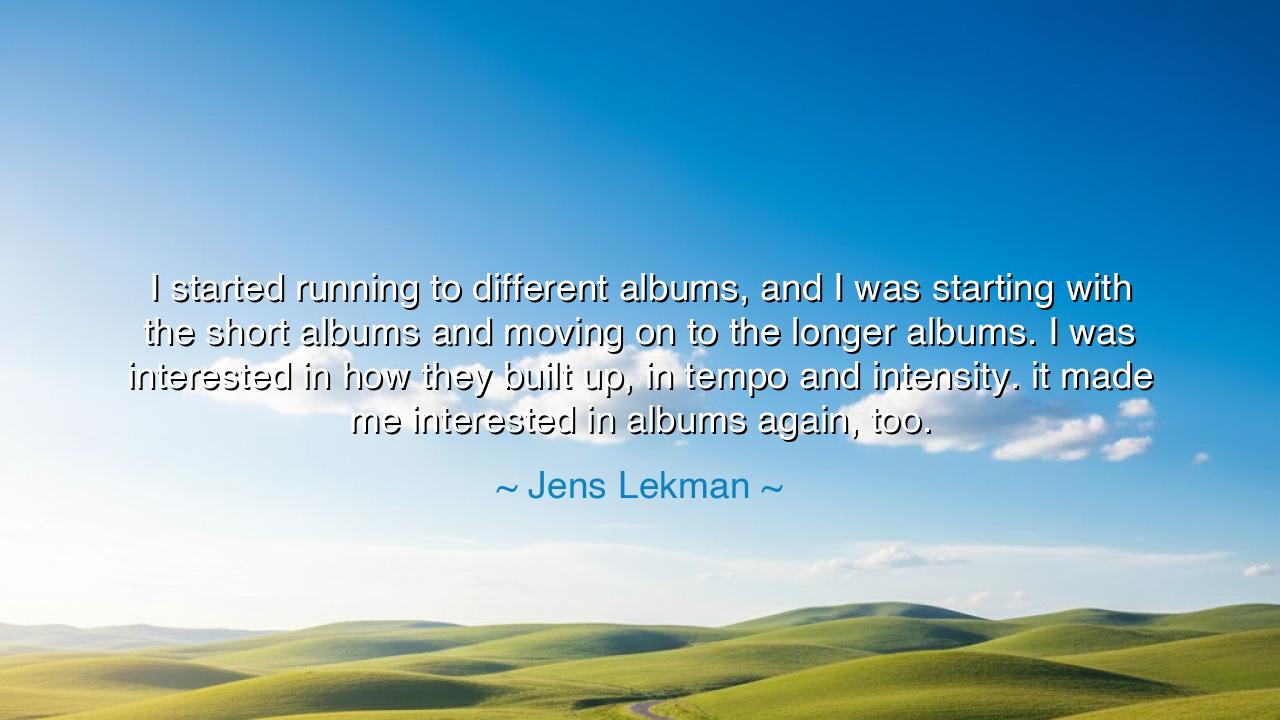
I started running to different albums, and I was starting with
I started running to different albums, and I was starting with the short albums and moving on to the longer albums. I was interested in how they built up, in tempo and intensity. it made me interested in albums again, too.






The words of Jens Lekman — “I started running to different albums, and I was starting with the short albums and moving on to the longer albums. I was interested in how they built up, in tempo and intensity. It made me interested in albums again, too.” — seem at first to be a casual reflection on music and exercise, yet within them lies a truth as old as humanity: that rhythm and structure guide our journeys, that growth comes in stages, and that endurance is not born all at once but cultivated gradually, through balance and steady progression.
To begin with the short albums is to respect the limits of the body and spirit. The wise do not attempt to master the great mountain in a single stride; they climb the foothills first, building strength. In this we hear the ancient discipline of patience, the willingness to accept small beginnings. The runner does not despise short distances, nor does the musician scorn a simple tune, for they are the foundation of all mastery. Lekman reminds us that it is in honoring these first steps that we prepare ourselves for greater journeys.
His moving on to the longer albums is a metaphor for growth. Just as music unfolds, layering sound upon sound, so life unfolds, layering experience upon experience. The increase in tempo and intensity reflects the very rhythm of existence: we begin in simplicity and move toward complexity; we begin in gentleness and grow toward trials of fire. The wise soul welcomes this progression, not rushing it, not resisting it, but learning to match its pace. To grow is to endure greater demands, and to endure is to grow stronger.
History offers a luminous reflection of this truth in the life of the philosopher Epictetus, once a slave. He began with the smallest of freedoms, enduring hardship, learning to master his mind when he could not master his body. Step by step, trial by trial, he grew in strength of spirit. By the time he was free, he had become greater than many rulers, for he had mastered the art of inner endurance. Like Lekman’s progression from short to long albums, Epictetus built gradually, finding strength in rhythm, not in haste.
There is also a deeper wisdom in Lekman’s rediscovery of albums themselves. In an age where songs are consumed in fragments, he was reminded of the beauty of the whole — of works designed to carry the listener on a journey from beginning to end. An album, like a life, is not merely a collection of moments but a story with arcs of tension, release, climax, and resolution. To pay attention to the tempo and intensity of such journeys is to remember that meaning is not found only in single notes, but in the progression that carries us through them.
The lesson is clear: whether in running, in music, or in life, begin small, grow steadily, and honor the rhythm of progression. Do not rush to the longest, most demanding task before you have tasted the shorter, simpler ones. Allow yourself to be carried by the tempo of growth, learning from each stage. And remember that life, like an album, has its movements — some gentle, some fierce, but all necessary to complete the story.
Practical wisdom follows. In your own life, structure your growth as Lekman structured his runs: begin with smaller challenges, then step into greater ones. Approach your work, your studies, your relationships, and even your hardships as you would approach an album — listening for the flow, the rise and fall of energy, the lessons hidden in the quiet and in the storm. And above all, do not forget to savor the journey itself, for it is the rhythm, not just the destination, that gives life its music.
Thus, Lekman’s words endure as a subtle but profound teaching: growth is a song, life is an album, and we must learn to run with its rhythm. Start small, build steadily, embrace the rising intensity, and in time, you will find not only strength in body and spirit, but renewed wonder in the journey itself. For the wise know: the music of life is not in the fragments, but in the whole.






AAdministratorAdministrator
Welcome, honored guests. Please leave a comment, we will respond soon